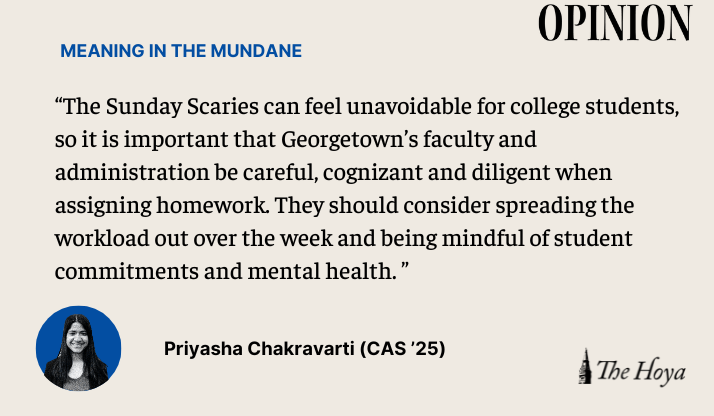The endless cycle goes like this: your phone alarm goes off on a Sunday morning, and you instantly hit snooze. You lie back down, desperate to return to the peaceful dream you were having. Instead, your mind gets bombarded by your never-ending to-do list — the overbearing need to fold your laundry, finish those homework assignments, go grocery shopping and start studying for your upcoming chemistry exam. These overwhelming thoughts send you down a chaotic spiral, all while still attempting to recover from the night before.
These experiences encapsulate the Sunday Scaries: the common feelings of dread and anxiety about the week ahead, endured by all college students at one point or another.
According to a LinkedIn survey, over 90% of Millennials and Gen Z report that they have felt the Sunday Scaries at some point. A study conducted by the University of Exeter pointed out that these negative feelings were particularly pronounced among those who “frequently checked their emails during the weekend, had tasks left over from the previous week and had unreasonably high expectations of themselves.” There are various causes of the Sunday Scaries cited in the study, but negative feelings often stem from an unhealthy work-life balance and general feelings of stress and apprehension.
Georgetown students, especially those who lead a work-hard, play-hard lifestyle, are the usual targets of the Sunday Scaries. Other victims can include those overloaded with club commitments and procrastinated assignments due on Sundays.
However, though the Sunday Scaries phenomenon may lead to negative feelings, they can also be a catalyst for positive mindset and behavioral change.
Oftentimes, the Sunday Scaries are caused by ruminating over the past or future rather than grounding ourselves in reality. To deal with these anxious thoughts, I find it helpful to first create a short and intentional to-do list to distinguish between academic assignments, personal tasks and extracurricular commitments.
There are various productivity methods circulating the internet, some of which I have tried and preferred over others.
The two-minute-rule, established by David Allen in his productivity book, “Getting Things Done,” is one that I often unintentionally follow. This rule states that we should first complete any task that takes two minutes or less to complete before moving on to longer assignments. The rule is intended to overcome the initial resistance we feel toward starting our work for the day.
I like to start by completing any miscellaneous, short tasks, whether that be responding to emails or washing the dishes, which helps to create a productive work flow. From there, I can begin to tackle my more difficult tasks.
Another popular productivity method is the Pomodoro Technique, a time management strategy consisting of 25 minutes of focused work followed by a five minute break. You repeat this process multiple times until you have completed one task and are ready to move onto another.
The goals of this method are to derail the initial resistance toward challenging tasks, create a productive work flow and provide a reward at the end. I occasionally start to feel that the 25 minutes is not enough and choose to keep working, often surpassing my goals.
The Sunday Scaries can feel unavoidable for college students, so it is important that Georgetown’s faculty and administration be careful, cognizant and diligent when assigning homework. They should consider spreading the workload out over the week and being mindful of student commitments and mental health.
Weekends should be a time to relax and recharge amidst busy college schedules, not a time of stress and constant club meetings. Likewise, student leaders should remain aware of members’ varying schedules and avoid prolonging meeting times.
Ultimately, while we must try to control our negative feelings, the Sunday Scaries do ultimately propel us to get out of bed and get our stuff done. It pushes us to find productive ways to tackle our workload and achieve our full potential at Georgetown.
Priyasha Chakravarti is a junior in the College of Arts and Sciences. This is the first installment of her column, Meaning in the Mundane.














